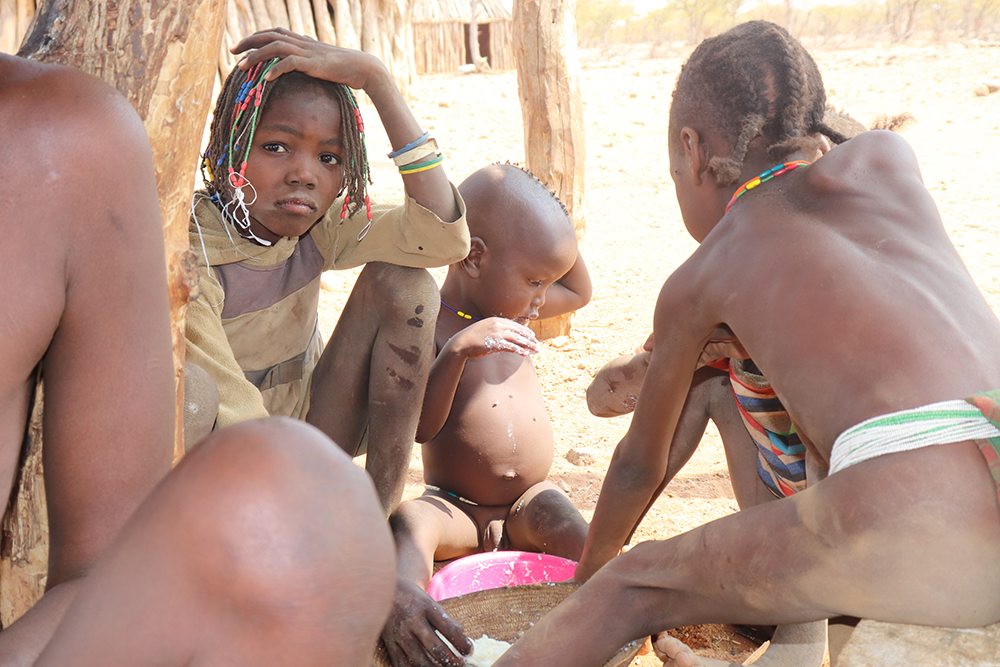By Mercy Karuuombe| 1 October 2021
ANDREAS Tjipuiko would like you to know that you can’t sleep with his wife. Nor, if you were perhaps interested in the 63-year-old Omuangete village leader, can you expect to sleep with him if you come to visit.
Yet when his dear cousin comes to stay, Tjipuiko will offer him the best room he has. His own room. With his wife.
His wife could extend the same gesture to one of her loved ones. And they would expect the same courtesy when they visit.
“I’m not bothered by the fact that my wife is spending a night with another man, because he is just not a random man,” Tjipuiko says.
“He is my cousin, my best friend, who I love so much that I let him sleep with my wife.”
Travelling is what the Ovahimba do. Following their herds, moving with the grazing patterns.
Couples can be separated for weeks at a time, especially if young mothers need to stay behind to care for children, while fathers tend to the cattle.
And in that life, there’s not much room for jealousy.
“We do not give our wives to anyone who comes to visit us. We give them to a cousin, usually someone you’ve known all your life. Someone we love and hold close to our hearts,” Tjipuiko says.
There’s a word for this custom of including people you deeply love in your most intimate relationships: okujepisa.
Translations are hard, but it does not mean ‘wife-swapping’, an expression that conjures up the informality of free love, the cheekiness of reality TV, and the shock value of click-bait headlines.
None of that gets it right. For starters, okujepisa includes letting a wife share her husband with someone she holds dear.
Ukatondo Tjirambi, who also lives at Omuangete, says when her most cherished friends visit, she doesn’t hesitate to sacrifice her marital bed.
“This can be done anywhere, when my best friend comes to visit us, or when we are at events,” she says.
“I can just tell her that I would like her to spend the night with my husband.”
“I don’t feel betrayed by the woman I give to my husband,” she says. “You can tell if she really wants the man, or if she’s just doing it for the night and will not develop feelings for him.”
MISCONCEPTION
Whenever okujepisa enters public consciousness, the tone is rarely sympathetic.

‘Five crazy sexual traditions that are still practised in Africa’, read a 2018 headline in Business Insider Africa.
‘Is wife swapping swinging with an African tribal touch?’ asked a headline in The Sowetan.
In 2019, British reality television star Scarlett Moffatt moved her family into a Himba community – in a recreation of their County Durham home built for a show called ‘The British Tribe Next Door’.
The Mirror wrote about it under ‘Scarlett Moffatt joins ‘sex-swapping’ tribe as part of shock new experiment’.
Given that okujepisa affects no one outside of a couple’s innermost circle of confidants, all of the attention begs the question, why do people outside of the Kunene region care so much?
Health workers have worried for decades about the spread of HIV, and now fears of Covid-19 also permeate discussions around sex in the Kunene.
But HIV remains less common among the Ovahimba than in the nation at large.
Covid-19 seems to have affected the Ovahimba no more than other communities where large families share small sleeping areas.
Health concerns are real, but what keeps coming up in conversations at Omuangete is something more basic, more intuitively human: jealousy and shame.
It’s not that the Ovahimba do not share in those emotions, but that the boundaries are different. For the vast majority of people around the world, it’s hard to understand why a spouse doesn’t feel jealous of the other lover, or ashamed at finding comfort outside of the marriage.
And what about the children? What happens to all of the children born out of wedlock?
Scientists have actually spent considerable time thinking about these issues.
Rob Brooks, a researcher at the University of New South Wales in Australia, looked around the world for reliable data on monogamy and various other types of relationships.
To measure that, he used genetic data to look at how many children are raised by someone other than the man who thought they were the children’s father.

In general, around the world, one to three percent of children are raised by someone other than their biological father.
Among the Ovahimba, that figure was 48% – the highest number he found anywhere.
What’s more, 70% of married couples had a child fathered by someone other than the woman’s husband.
While people at Omuangete didn’t know those numbers, they wouldn’t be surprised.
‘SHE DOES NOT ALWAYS AGREE’
Tjipuiko says people in his community believe all children should be treated equally – regardless of who their father is.
If his wife had a child with another man, he would raise the child as his own – and not think twice about it.
“I have not seen an incident where a man has come to claim a child from another family,” he says.

“In our tradition, if a woman has a baby with another man while she’s married, she will raise that child with her husband.”
“The same applies to the man,” he says. “If I were to get my cousin’s wife pregnant, he would treat the child as his own, even if he knows the child is biologically not his.”
Underpinning that view of children is a fairly expansive view of consent and inclusion.
Perhaps it says more of outside cultures that okujepisa is often translated as ‘wife swapping’ – as opposed to say, ‘husband swapping’.
If anything, a closer translation would be ‘polyamory’, where more than two people are involved romantically, with the informed consent of everyone in the relationship.
In interviews, questions about consent were answered delicately, less out of avoidance than consideration.
“My wife doesn’t always agree to sleep with the man I have offered,” Tjipuiko says.
“She can refuse, and no one will force her to be intimate. But I’ll still give up my bed, they will sleep under the same roof.”
Saying no can be hard, Tjirambi admits, and in the past, women could have been forced into sex.
But she believes that has changed.
“As much as you do not want him, your husband will tell you that ‘You have no say in it. My cousin or friend will sleep in that room where you are sleeping’,” she says.
“You will not say no to your husband, and yes, we’re left to spend the night together with his friend. But you can still refuse to get intimate. We just don’t reject them in front of our husbands,” Tjirambi says.
CONSEQUENCES
None of this means that infidelity is allowed. Secret affairs are punished harshly.
“If a woman is caught with another man who was not agreed on, her husband will collect all of this other man’s livestock.
The other man will not do anything about it, because he is having an affair with a married woman who he has not been given to,” the village chief says.
Karipangura Tjiposa (36) says he knows his wife sometimes rejects the man he has brought to their bed.
And the opposite can sometimes happen too, where feelings begin to develop outside of the marriage.
If that happens, he says he can only blame himself.
“I gave her the right to have something with this man. That’s why she’s developed feelings for him,” Tjiposa says.
But, he adds, there’s a way to show those feelings respectfully, without rubbing the husband’s face in it.
For a nomadic community, where partners can be separated for weeks at a time, maybe that’s what the Ovahimba have figured out.
Not how to do away with jealousy, but how to manage it.
And how to make sex and child rearing an act of kindness.
“Jealousy is everywhere as well, and so are temptations,” says Tjipuiko.
“How you take care of it is what matters, which is why we do this with people we hold dear to us, because they can never betray us.”
- This article has been produced by The Namibian’s Investigative Unit with the support of the Open Society Initiative for Southern Africa. Send story tips via your secure email to investigations@namibian.com.na






